
Courtesy of Marazul Charters
There has been no shortage of news headlines about Cuba lately, which is all due to the improving relations with the U.S. Back in December, President Barack Obama made the historic announcement that diplomatic relations with Cuba would be reopened after decades of isolation between the two countries.
Some people rejoiced. Some people got angry. And a lot of folks started dreaming of finally visiting a country they’d never even thought to dream about visiting.
Now, embassies in both countries have re-opened and the travel restrictions have been relaxed even more.
Awesome, right?
Not so fast.
Simply because relations are thawing and embassies have opened doesn’t mean you can simply book a flight and head to Cuba for a long weekend.
“It’s a developing situation, although it certainly made it easier from a legal standpoint,” said Bob Guild, vice president of Marazul Charters, a charter and travel agency specializing in sending legally licensed travelers to Cuba.
“No other country has had restrictions from traveling to Cuba and [the U.S.] doesn’t have any travel restrictions except for Cuba,” he said.
In order to legally travel to Cuba, you must fall within these 12 categories (and, no, they aren’t necessarily tons of fun):
Family visits
You can travel to Cuba if you are planning to visit a “close relative” who is a national of Cuba, who is a resident of Cuba, who is in
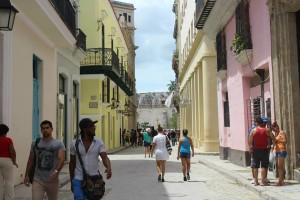
Courtesy of Marazul Charters
the country for more than 60 days for educational activities, or who is in Cuba for official government business.
The government defines “close relative” as any person you’re related to through blood, marriage or adoption who is no more than three generations removed from that person or from a common ancestor with that person.
People to people travel
This type of travel is an initiative allowing U.S. citizens to travel to Cuba on a limited basis in order to participate in cultural experiences and have direct contact with Cuban people. This allows U.S. travelers the opportunity to learn more about Cubans and their culture as well as Cubans learning about the American way of life.
It’s this type of travel to Cuba that resonates with Guild.
“There is no country that I have found where the people are friendlier to people from the United States than Cuba is. They have always made a very sharp difference between the government of the U.S., and the people of the U.S., and you feel it when you’re there. You don’t always get that when you’re in other places,” he says.
“They have their own culture, their own needs – so we wanted to have people from the U.S. experience that in Cuba. We can learn from each other,” Guild says of the work he does through Marazul Charters.
Official business of the U.S. government, foreign governments and certain intergovernmental organizations
People who are employees, contractors or grantees of the U.S. government, any foreign government, or any intergovernmental organization of which the U.S. is a member or holds observer status are allowed to travel to Cuba if they are traveling on the official business of those groups.
Journalistic activities
People who are regularly employed as journalists by news organizations, are regularly employed as supporting broadcast or technical personnel, and freelance journalists with a record of previous journalistic experience working on freelance projects are permitted to travel to Cuba. In addition, broadcast or technical personnel with a record of previous experience who are supporting a freelance journalist on a freelance journalistic project are authorized to travel to Cuba. However, the stipulation within this category is that all their activities while in Cuba must be journalistic and their schedule can’t include free time or recreation in excess of that consistent with a full-time work schedule.
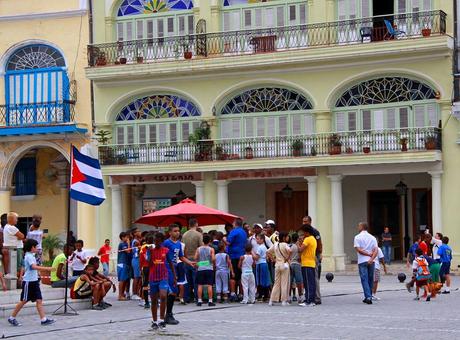
Courtesy of Marazul Charters
Professional research in Cuba
Travel to the country is authorized for professional research. But, the purpose of the research must relate to the traveler’s profession, professional background or area of expertise, including the area of graduate-level full-time study. This type of traveler can’t engage in recreational travel, tourist travel, travel in pursuit of a personal hobby or research for personal satisfaction only. Similarly to journalists, professional researchers in Cuba must have a schedule of activities that doesn’t include free time or recreation that’s in excess of what a full-time schedule of professional research is.
Professional meetings in Cuba
People can travel to Cuba for professional meetings, provided that the purpose of the meeting is not promoting Cuban tourism. The purpose of the meeting must directly relate to the traveling attendee’s profession, professional background or area of expertise. This type of travel can’t include engaging in recreational travel, tourist travel, or traveling for a hobby. And, once again, the activities schedule can’t include free time and recreation that exceeds a full-time schedule of attending professional meetings or conferences.
Educational activities
U.S. academic institutions and their faculty, staff and students are allowed to travel to Cuba as long as the coursework while there is related to Cuba. In addition, these groups can travel to Cuba for academic seminars, conferences and workshops if they’re related to Cuba or global issues involving Cuba.
“Academic travel by colleges and universities is now legal. It’s been much easier legally, it’s changed completely from that
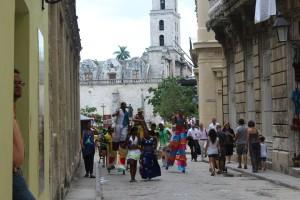
Courtesy of Marazul Charters
standpoint,” Guild says.
Additionally, these groups are allowed to travel to Cuba to plan the coursework and academic seminars in advance.
Religious activities in Cuba
People, including U.S. religious organizations and its members and staff, are authorized to travel to Cuba as long as they have a full-time schedule of religious activities.
Support for Cuban people
People engaging in activities recognized by human rights organizations or independent organizations promoting a quick, peaceful transition to democracy are authorized to travel to Cuba.
Other categories include humanitarian projects designed to benefit Cuban people; activities of private foundations, or research or educational institutes; transactions related to information and Informational materials; exportation and re-exportation of certain Internet-based services; amateur and semi-professional international sports federation competitions; and public performances, clinics, workshops and other athletic or non-athletic competitions or exhibitions.
What these categories mean is that Cuba isn’t a destination for people who want to sit and relax in paradise, sipping on a frozen cocktail. However, despite that and the fact that you must fit within one of these 12 categories, you shouldn’t be discouraged from traveling to Cuba.
“You don’t go to Cuba to visit paradise – you go to Cuba to see reality,” Guild says. “From my experience, going down there since the 1970s, I see Cuba as a really incredibly impressive small country that has challenged the status quo and that has tried to improve a lot.”
If you want to go to a beach, Guild says you can go to a beach in Cuba, although you’ll likely have a similar experience as you would on a beach in France or Cancun, Mexico.
“If they have a curiosity about anywhere else in the world, then I would say to them that Cuba should be on the top of their list. There are all kinds of travel experiences, but if you want to experience a society that has been off limits to the U.S. for the past few decades, that’s Cuba,” he says.
Despite the warming relations between the two countries and even if you fall within the 12 categories, traveling to Cuba, logistically, is still a bit difficult.
Firstly, major airlines haven’t really started flying to Cuba yet.
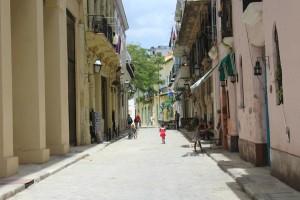
Courtesy of Marazul Charters
“Right now, you have to go on charter flights from Miami to Havana or other cities in Cuba. There are eight or nine other charter companies that do the same thing,” Guild explains.
While there are multiple flights each day from Miami, with even more flights being added from places like Tampa, New York and Orlando, operated by carriers like American Airlines and JetBlue, you still need to book seats through a third-party charter company. Airlines won’t be able to sell tickets on these flights to Cuba directly until the U.S. and Cuba negotiate a new civil aviation agreement.
Finding space to lodge there may be difficult as well.
“They already have 2.5 million visitors from other countries,” Guild says. “They’ve had a 38 percent increase in travel from the U.S. and they’ve had an increase from other parts of the world. Their hotels are mainly full.”
However, Airbnb is now offering service in Cuba, a chance to make a personal connection with Cuban families, not to mention to enjoy delicious authentic meals.
Other snags for travelers: U.S. credit cards are accepted in Cuba, but only from banks who offer service in Cuba. There are very few ATMs in Cuba and many establishments don’t have the means to process credit card payments – making cash king for the time being.
Due to poor infrastructure, U.S. cell phones may not work in Cuba and Internet connection is spotty.
Although traveling to Cuba may seem like a hassle and confusing when it comes to the legality of it, many believe now is the time to go – people want to see and experience Cuba before it becomes too “Americanized.” Plus, it’s possible that the next U.S. president could tighten the travel restrictions and reverse the changes enacted by President Obama.
“This is the time. Thousands are requesting to travel to Cuba and a huge number of people in our country want to see Cuba—they feel like they haven’t been able to before.” Guild says.
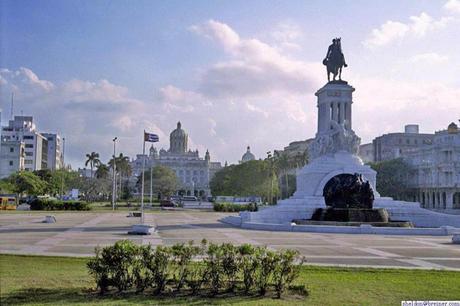
Courtesy of Marazul Charters
If you go
As detailed here, going to Cuba may have just gotten easier for American travelers, but it still isn’t that easy – you need to have your eyes wide open. The key is to plan ahead and set your expectations properly.
Here are some key things travelers from the US need to keep in mind if they travel to Cuba:
- Check the rules and regulations on who’s allowed to travel to Cuba; you need to have a legitimate purpose for traveling there. Therefore, it’s smart to begin planning your trip by seeing if the reason you’re heading there is allowed, or you can build your trip around an approved purpose.
- Think about how you’re getting there. Currently, there are only a few flights to Cuba from select American cities. So, depending on where you’re coming from, you may need to do some driving or take a bus or train.
- See your doctor. Before any trip abroad, it’s wise to visit your doctor to make sure you’re up to date with shots and immunizations, as well as healthy enough to travel. Check out the CDC’s website for more health information. And, of course, purchase travel health insurance.
- Book your hotel. Early. Most hotels are close to full, so you need to plan well ahead of time to ensure you can get a room. You could also try Airbnb, which now operates in Cuba.
- Bring cash. There are very few ATMs in Cuba, and many businesses cannot process credit cards. If they do accept credit cards, the card must have been issued by a bank that offers service in Cuba.
- Forget about your cellphone. The cellular infrastructure in Cuba is spotty at best. If you go, you’ll need to rely upon landlines, which means communicating hotel phone numbers to friends and loved ones before you begin your trip. Again, it’s just a different level of planning ahead.


